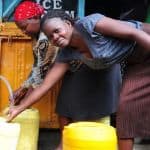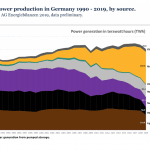From Smart Meters to ‘Water ATMs’: Innovative Solutions to Bring Water Services to Rural Africa
An estimated 663 million people lack access to clean and safe drinking water in the world today. Innovations such as smart metering and mobile money pay-as-you-go (PAYG) services are being tested to enhance access to water and other basic utilities. Scaling up such solutions will contribute to the realization of UN Sustainable Goal 6 that aims to ensure the availability and sustainable management of water and sanitation for all by the year 2030.
Access, quality and payment are three important challenges bedeviling the provision of water and other basic utilities to low-income populations. “Smart,” “intelligent” and “multi-functional” water meters – leveraging built-in sensors and digital devices specially made on the basis of Internet of Things (IoT) – can measure water levels, leakage and water quality and more importantly send data to a portal or other device for further analysis and action. Such meters and convenient payment mechanisms, leveraging mobile money services, can help respond to the triple challenges of universal access to water services – especially among low-income households.
Eseye engineering, UK, develops simple meters and/or readers with built-in sensors that facilitate multiple functions through mobile telephones. However, these solutions have not been widely adopted and the few ongoing pilot tests are currently being deployed only at water vending points. Few are being designed for universal access at the household level. In other words, metered vendors have significantly improved access to those within a 2- to 5-kilometer radius. But how can these innovations be upscaled to the household level?
One possibility, the eWATERpay solution – or water “ATM” – is being tested at water vending points in villages by the Lilongwe Water Board and Nairobi Water Company’s Agtap. Customers use pre-paid Near Field Communication (NFC) cards to purchase water. This has reduced the distance they have to travel to get water, and reduced the risks of contamination. Since the meters provide detailed transaction records, many merchants are willing to venture into the water vending business. And more water vendors mean greater access to high-quality water within shorter distances. Plus, the prepayment system enables buyers to monitor their water service expenses.
There would be a great opportunity to scale up access to water if these prepaid meters were installed at the household level. Households would be assured of access to high-quality water and, with the pay-as-you-go system, utility providers would be assured of payment through convenient mobile money services and therefore incentivised to expand water infrastructure and their network.
However, adoption of these technologies has been low across many African countries, e.g. Kenya, Tanzania and Ghana, because of low investment to facilitate partnerships and upscale new technologies. A few of the innovators at the recent GSMA Mobile 360 event in Dar Es Salaam mentioned capital requirements in the range of US $500,000-$2 million to refine the solutions and pilot test challenges before full rollout. Such investments require private investors; thus, development agencies promoting initial tests should link the innovators with potential private investors for the scale-up phase.
For example, water utilities should be interested in investing in such initiatives. As noted by the World Bank’s Water and Sanitation Program (WSP) India, poor billing and collection practices have huge commercial implications and significantly affect a utility’s creditworthiness and access to commercial finance. A three-month pilot test of prepaid water meters with 200 households by Water Tek Africa in Tanzania led to a 30 percent improvement in revenue collection and a 20 percent reduction in operating expenses to the utility company.
Finally, the demand side requires support to adapt the new technologies. What would it cost to install such meters at the household level? What after-sale services would the utility company provide? It should be noted that Tanzania’s electricity company required prepaid meter inspectors to ensure continued functionality and minimize non-technical losses. And adequate social marketing is required to trigger sufficient demand to ensure adoption of the prepaid meters. MicroSave’s past work on social marketing strategies and customer support is informative when deploying such innovative solutions to scale up access and impact of water and sanitation.
Development interventions have made great progress to improve access to water. However, millions of people especially in developing countries still lack access to clean and safe drinking water, resulting in high incidences of diarrheal diseases and death. Wide adoption of pay-as-you-go systems can enhance access to piped water at the household level, with the development and adoption of special meters. Ongoing pilot tests have shown potential for significant changes in the water sector with adoption of such smart meters as witnessed in the energy and mobile telephone sectors. While households have control of the water and pay more conveniently, improved revenue collection ensures that the utility providers invest in the network.
George Muruka, a principal consultant at MicroSave, is based in Kenya and leads the Private Sector Domain in Africa.
Photo courtesy of eWATERpay.
- Categories
- Technology, WASH




